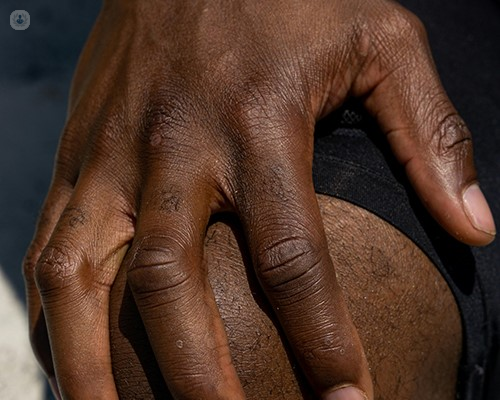Improving mobility: A guide to knee replacement surgery
Written in association with:Knee replacement surgery, also known as arthroplasty, is a prevalent procedure aimed at replacing a damaged, worn, or diseased knee with an artificial joint. This surgery can significantly improve the quality of life for those suffering from severe knee pain and mobility issues. In his latest online article, Mr Trevor Lawrence gives us his insights.

Who needs knee replacement surgery?
Adults of any age may be candidates for knee replacement surgery, although it is most commonly performed on individuals between the ages of 60 and 80. The necessity for this surgery arises when the knee joint is so worn or damaged that it hampers mobility and causes pain even while at rest.
Osteoarthritis is the leading cause of knee damage necessitating replacement, but other conditions like rheumatoid arthritis, haemophilia, gout, bone disorders, blood supply issues leading to bone death, knee injuries, and deformities can also lead to severe knee damage.
Criteria for surgery
Knee replacement is usually considered only after other treatments, such as physiotherapy or steroid injections, have failed to alleviate pain and improve mobility. Patients might be offered this surgery if they experience:
- Severe pain, swelling, and stiffness in the knee joint
- Reduced mobility affecting daily activities and quality of life
- Pain severe enough to interfere with sleep and overall wellbeing
- Difficulty performing everyday tasks
- Depression due to pain and lack of mobility
- Inability to work or engage in social activities
Additionally, candidates must be in good health to handle both the surgery and the subsequent rehabilitation process.
Types of knee replacement surgery
There are two primary types of knee replacement surgery:
Total knee replacement (TKR): This involves replacing both sides of the knee joint.
Partial knee replacement (PKR): Only one side of the knee joint is replaced. This smaller operation typically has a shorter hospital stay and recovery period and is often preferred for younger patients aged 55 to 64, as the artificial joint may need to be redone within 10 years.
Alternative surgical options
In some cases, other surgical options may be considered, though their long-term results are generally less favourable compared to knee replacement. These include:
Arthroscopic washout and debridement: Inserting an arthroscope to wash out the knee with saline and remove loose bone or cartilage.
Osteotomy: Cutting and realigning the shin bone to shift weight away from the damaged part of the knee.
Mosaicplasty: Transferring plugs of healthy cartilage and underlying bone from another part of the knee to repair the damaged surface.
Preparing for surgery
Preparation is very important for a successful knee replacement surgery. Patients are advised to stay as active as possible, strengthening the muscles around the knee through gentle exercises like walking and swimming. Hospitals often provide written materials or videos detailing the procedure. Additionally, patients should prepare for their hospital stay and the subsequent recovery period by arranging travel, packing appropriately, and attending a pre-operative assessment.
Recovery process
Post-surgery, patients typically stay in the hospital for 3 to 5 days. Upon discharge, they receive guidance on home care for the knee. Initially, walking aids such as frames or crutches will be necessary, and a physiotherapist will provide exercises to strengthen the knee. Most patients can stop using walking aids about six weeks after surgery and may start driving within 6 to 8 weeks. Full recovery can take up to two years as scar tissue heals and muscles are strengthened. However, a small percentage of patients may continue to experience pain after two years.
Risks and complications
While knee replacement surgery is common and generally successful, it does carry risks. Potential complications include:
- Stiffness of the knee
- Infection of the wound or joint replacement
- Unexpected bleeding into the knee joint
- Damage to surrounding ligaments, arteries, or nerves
- Deep vein thrombosis (DVT)
- Persistent pain in the knee
- Bone fractures around the knee replacement during or after the operation
Despite these risks, the benefits of reduced pain and improved mobility make knee replacement surgery a viable option for many suffering from severe knee issues. Consulting with a healthcare professional can help determine the best treatment plan based on individual health conditions and needs.
Mr Trevor Lawrence is an esteemed orthopaedic surgeon. You can schedule an appointment with Mr Lawrence on his Top Doctors profile.


